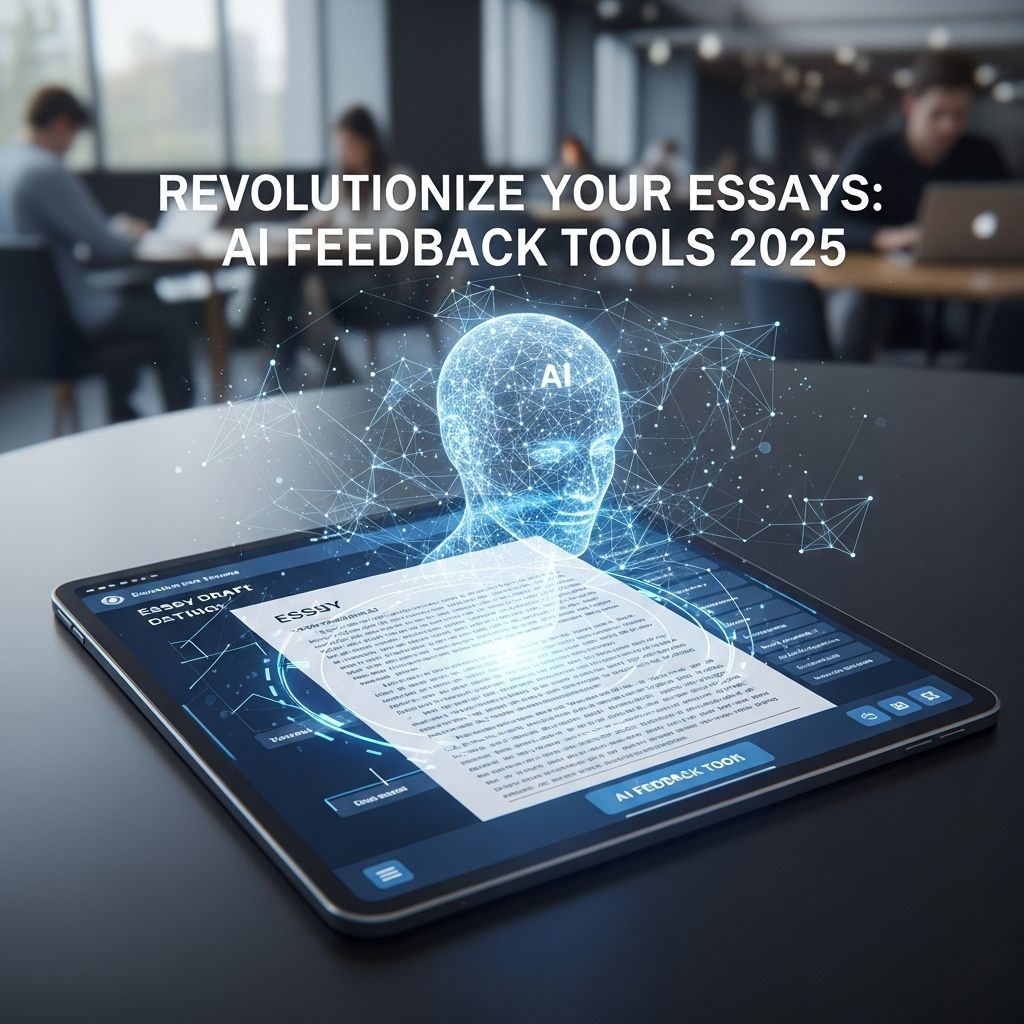Revolutionize Your Essays with AI Feedback Tools
Discover how AI feedback tools can transform your essay writing in 2025, enhancing quality and efficiency like never before.

In an age where technology continues to reshape the educational landscape, the traditional approach to essay writing is being challenged by innovative AI feedback tools. These tools promise not only to enhance writing skills but also to streamline the feedback process, making it more efficient and effective for both students and educators. As we look ahead to 2025, the role of AI in improving the writing process is becoming increasingly significant. This article delves into how these advanced tools function, their benefits, and what the future holds for essay writing.
Table of Contents
The Evolution of AI in Education
The integration of artificial intelligence in education has evolved significantly over the years. Initially, AI applications were primarily focused on administrative tasks, such as grading and attendance. However, as technology has advanced, so too have the capabilities of AI, extending into more complex areas like personalized learning and writing assistance.
Historical Context
To understand how we arrived at today’s AI feedback tools, it’s essential to explore the historical context:
- Early 2000s: Basic grammar checkers emerged, offering limited feedback on spelling and punctuation.
- 2010s: Advanced tools like Grammarly began to gain popularity, focusing on grammar and style improvements.
- 2020: The onset of natural language processing (NLP) technologies allowed for more nuanced feedback on writing structure and coherence.
How AI Feedback Tools Work
Modern AI feedback tools utilize sophisticated algorithms and machine learning techniques to analyze written content. They evaluate various aspects of writing, including grammar, style, structure, and even the underlying logic of arguments. Here’s how they work:
Key Components of AI Feedback Tools
| Component | Description |
|---|---|
| Natural Language Processing | Analyzes text to understand context, meaning, and grammatical structure. |
| Machine Learning | Improves feedback accuracy over time by learning from user interactions and corrections. |
| Stylistic Analysis | Evaluates the tone and style of writing to ensure it aligns with the intended audience. |
| Plagiarism Detection | Compares text against a vast database to identify potential plagiarism issues. |
Feedback Process
The feedback process can be broken down into several steps:
- Input: Users submit their essays or written content to the AI tool.
- Analysis: The AI processes the document, identifying areas for improvement.
- Feedback Generation: The tool generates a report detailing strengths and weaknesses, along with actionable suggestions.
- Revision: Users make revisions based on the feedback provided and can resubmit for additional input.
Benefits of Using AI Feedback Tools
Implementing AI feedback tools in the essay writing process offers numerous advantages:
Enhanced Learning Experience
Students receive immediate feedback, which fosters a more dynamic learning environment. Key benefits include:
- Personalization: Feedback is tailored to individual writing styles and areas of struggle.
- Real-Time Assistance: Writers can receive suggestions instantly, allowing for timely revisions.
- Improved Writing Skills: Continuous feedback helps students develop better writing habits over time.
Efficiency for Educators
For educators, AI feedback tools reduce the burden of grading while improving the quality of feedback:
- Time-Saving: Teachers can allocate their time on more pressing educational needs rather than proofreading.
- Consistency: AI provides standardized feedback across all submissions, ensuring fairness.
- Data-Driven Insights: Educators can analyze trends in student performance to tailor their teaching strategies effectively.
Challenges and Limitations
Despite their advantages, AI feedback tools also encounter challenges that must be addressed:
Accuracy and Reliability
AI tools are not infallible. Their suggestions may occasionally lack contextual understanding, leading to:
- Misinterpretation: Nuances in language or tone may be overlooked.
- Over-Correction: AI might suggest changes that alter the writer’s voice or intent.
Dependency Issues
Relying heavily on AI tools can lead to:
- Reduced Creativity: Students may become overly reliant on suggestions, hindering their original thought process.
- Skill Degradation: Without traditional feedback, students might not develop critical writing skills.
The Future of AI Feedback Tools
As we move toward 2025, the potential for AI feedback tools in essay writing appears promising. Here are some trends we can expect:
Integration with Learning Management Systems
AI feedback tools will likely become integrated within popular learning management systems (LMS), allowing seamless access for students and educators.
Advanced Personalization
Future tools will leverage data analytics to offer even more personalized feedback based on student performance, learning styles, and preferences.
Collaboration Features
We may see the development of collaborative features where students can work together on essays, receiving collective feedback from AI tools on group projects.
Conclusion
As AI continues to evolve, so will its influence on education, particularly in writing. The integration of AI feedback tools is set to revolutionize how essays are written and assessed, enhancing the learning experience for students while providing educators with valuable insights. While challenges persist, the future looks bright for those willing to embrace technology as a partner in the educational journey.
FAQ
What are AI feedback tools for essays?
AI feedback tools for essays are digital platforms that utilize artificial intelligence to analyze and provide constructive feedback on writing, helping users improve their essays.
How can AI feedback tools enhance essay writing?
AI feedback tools enhance essay writing by offering real-time suggestions on grammar, style, structure, and coherence, making it easier for writers to refine their work.
Are AI feedback tools reliable for academic writing?
Yes, AI feedback tools are designed to provide reliable and insightful feedback, although it’s important for users to critically assess the suggestions given.
What features should I look for in an AI essay feedback tool?
Look for features like grammar and spell checking, style suggestions, plagiarism detection, and personalized feedback to enhance your writing experience.
Will using AI feedback tools improve my writing skills?
Using AI feedback tools can significantly improve your writing skills by helping you identify common mistakes and learning from the feedback provided.
Are there any limitations to AI feedback tools?
While AI feedback tools are helpful, they may not fully understand context or nuance, so human oversight and editing are still essential for high-quality writing.





